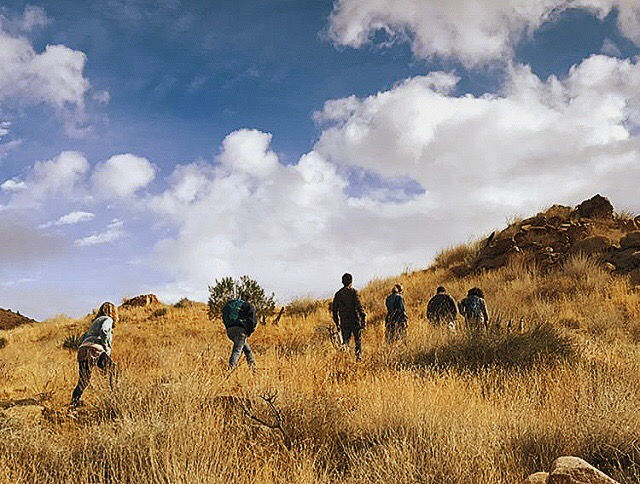The Joshua Trees Need Your Voice of Protection.
- Christina Every Leaf Speaks Botanical Studies
- Jul 16, 2020
- 3 min read
If you missed Brendan Cummings, Conservation Director of Center for Biological Diversity presentation in June of why the Joshua Tree needs protection, Brendan a Joshua Tree local environmentalist will once again share this timely information of why Yucca brevifolia Western Joshua Tree needs your protection to prevent their possible extinction. Mojave Desert Land Trust will host the zoom presentation which will inform you from the ecology of the Western Joshua Tree to threats from climate change, wildfire, habitat loss due to urban development. Please register and share this information, you do not have to be a resident of the Mojave Desert to write the California Department of Fish and Wildlife.
Sadly politicians, the local city council and Chad Mayes state assemblyman are spreading a "for profit" fear mongering disinformation campaign to prevent the one year study to determine a threatened status for the Western Joshua Tree, desert local Chris Clarke delves into more on this in his "Letter to the Desert, Lying about Joshua Tree's".
On July 25, 2020 we will be having a peaceful, social distancing, mask wearing demonstration in Yucca Valley on the north corner of 29 Palms Highway and Old Woman Springs Road from 5:00 pm - 7:00 pm. Please click on this link for more on this event. Please come prepared with water and a hat.
In June the California Department of Fish and Wildlife had a hearing on this topic but the hearing was moved to August which means there is still time to voice protection. You do not have to be a resident of the Mojave Desert to voice the urgency of protection please join us in emailing the California Fish and Game Commission & influencers with the subject
"RE: PLEASE HELP PROTECT OUR JOSHUA TREES". Below are a list of folks on the committee along with topics of conversation.
Eric Sklar
President of California Fish and Wildlife @ fgc@fgc.ca.gov
Chad Dibble
Deputy Director Ecosystem Conservation Division @ chad.dibble@wildlife.ca.gov
Stafford Lehr
Deputy Director Wildlife and Fisheries Division @ stafford.lehr@wildlife.ca.gov
Wendy Bogdan
General Counsel Office of the General Counsel @ wendy.bogdan@wildlife.ca.gov
Isabel Baer
Native Plant Program Manager Habitat Conservation @ isabel.baer@wildlife.ca.gov
Here are some talking points you can consider including in your message:
Ideas courtesy of Mojave Desert Land Trust.
This important species is under a barrage of threats, including climate change impacts, wildfire risk, and large-scale development projects. Four published studies have concluded that without intervention, climate change alone creates a high risk of losing western Joshua tree habitat almost entirely.
The presence of the western Joshua tree benefits our economy. Its iconic presence attracts people to visit, live and work in the high desert. Its protection will encourage responsible development, preventing urban sprawl and overcrowding, increase property values, and preserve the rural quality of life which attracts people to our area.
While some protection is provided by local ordinances, these are inadequate to respond to the multitude of threats that could lead to its disappearance. Not all Joshua trees are within National Park and National Monument boundaries. In fact, 40% of Joshua tree habitat is on private land, where it has only modest protection at best.
We are at a critical juncture for the western Joshua tree. A collection of scientific studies predict the widespread decline of this iconic endemic species. Joshua trees don’t grow anywhere else on Earth. They attract visitors and new residents which, in turn, support our economy. In 2018, visitors to the National Park created an economic benefit of nearly $196 million both within the Park and its vicinity — that’s almost double the expenditure in 2014. For the local communities adjacent to the Park, 1,823 jobs were related to visitation.
Attracted by the area’s scenic beauty and Joshua trees, the real estate market in the Joshua Tree region has steadily increased. New residents generally are not seeking a home in densely developed areas such as a subdivision, but instead are looking for a more rural lifestyle, ideally with proximity to the National Park, and Joshua trees are a very desirable feature.
We recognize that the rapid growth of our communities and the dramatic increase in visitation at the National Park has resulted in its own issues such as traffic. These issues need to be addressed, but protection of the Joshua tree will help, not hurt our communities. Its listing will encourage local governments to develop a regional approach to conservation through a Natural Communities Conservation Plan. These plans focus on the conservation of large undeveloped areas, while encouraging new development on vacant land in already developed areas. This helps prevent sprawl and over development.
















Comments